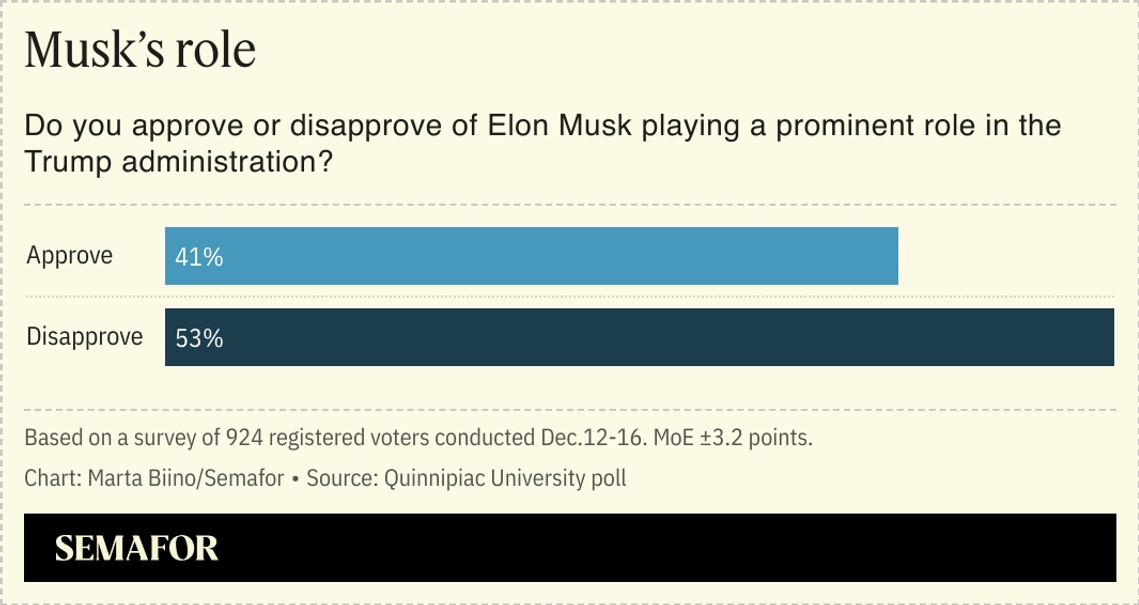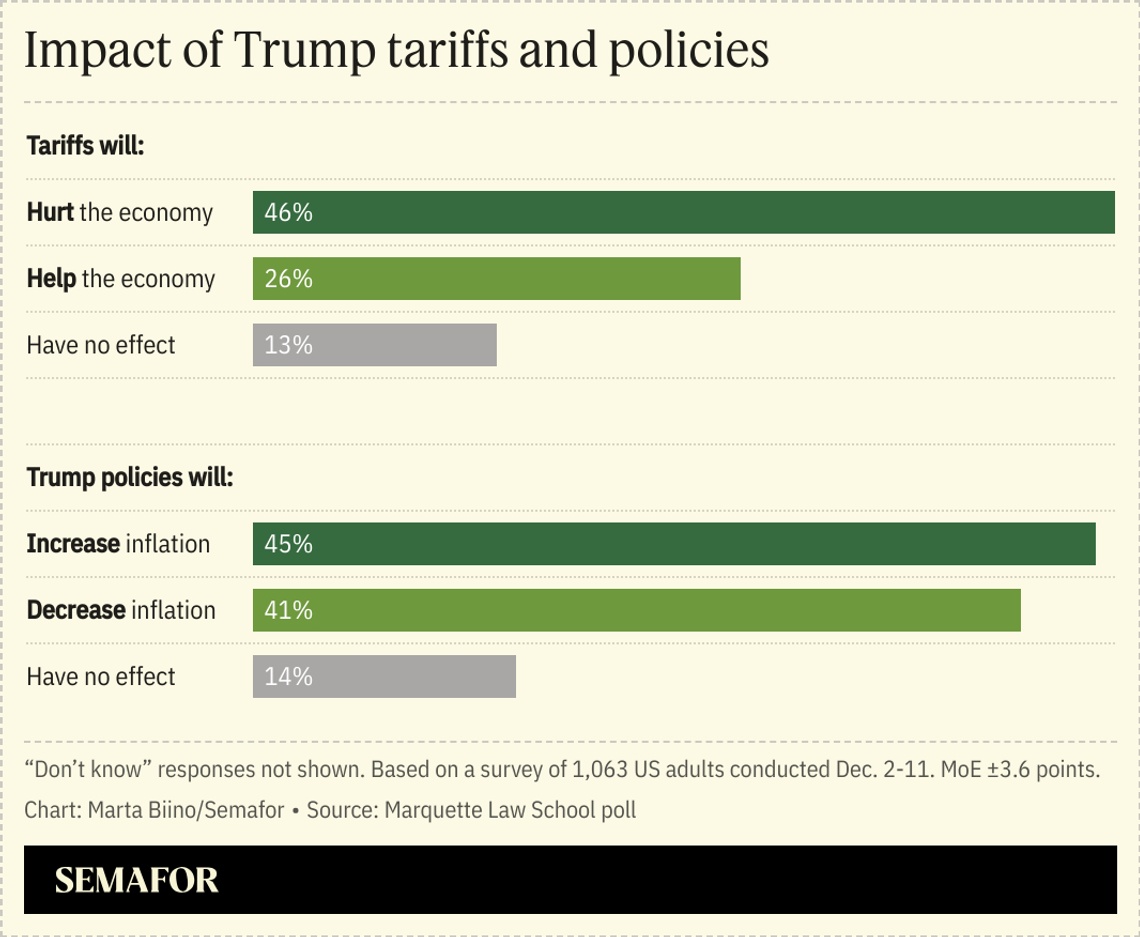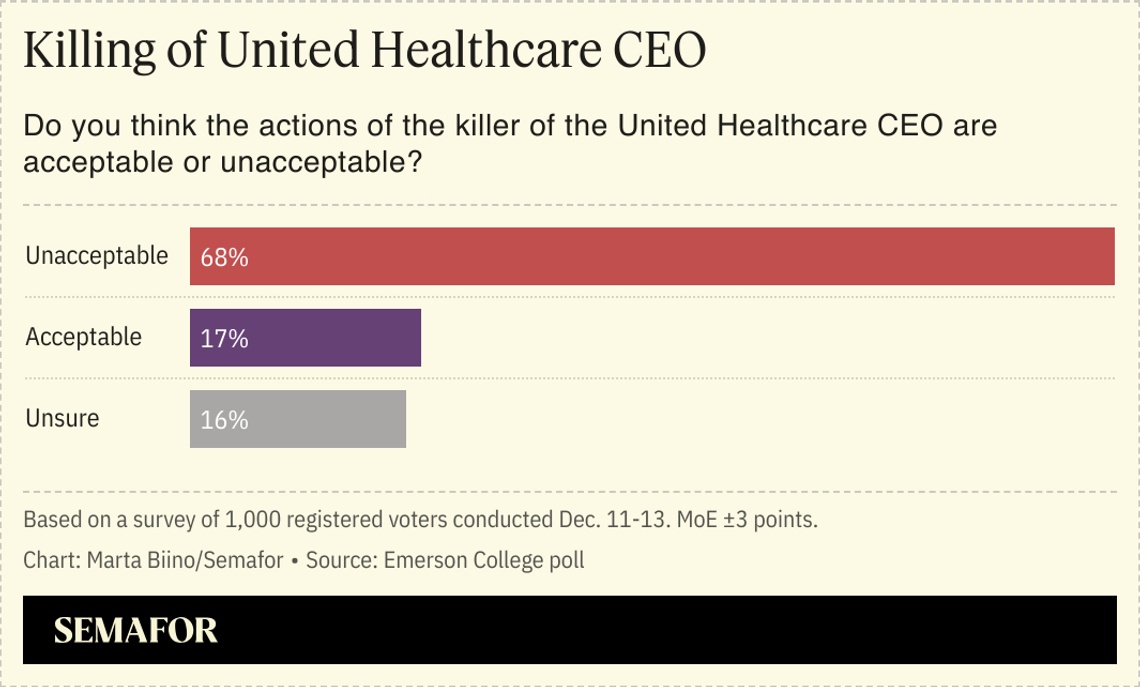 Polls Quinnipiac’s polling got the swing states right this year, modeling an electorate that was happier than ever with Donald Trump and ready to vote for him. It finds that voters are still mostly optimistic about his second term, by an 11-point margin, and the same voters are a little uncomfortable with Musk’s unofficial, all-reaching role. He’s less personally popular than Trump, especially with non-white voters, and independents disapprove of what he’s doing by 20 points. Eighty-one percent of Republicans approve, in sync with their members of Congress, who’ve embraced Musk and DOGE and started criticizing legislation (like the continuing resolution) for breaking faith with him.  Even as they look forward to Trump II, and agree with him on a few key issues — mass deportation, more drilling, banning gender medicine for minors — non-Republicans are a little worried about his economic agenda. Most worry that tariffs will be painful for them, and a smaller majority of non-Republicans don’t expect him to lower inflation. They have no Biden or Harris nostalgia, and Biden in particular has fallen to the lowest approval ratings of his presidency. But there are more pocketbook worries about Trump than “culture war” worries — on that, he’s winning.  Donald Trump condemned the killing of Brian Thompson and the fandom around his alleged killer. A handful of Democrats condemned the killing, then said they understood the fandom. Neither is very interested in the minority of voters — around one-sixth of the country in this poll — who don’t have a big problem with Thompson’s death. Forty-one percent of voters under 30 say that the killing was either “somewhat” or “completely acceptable, a fringe view (10% or less) among voters over 50. Younger voters consistently say that they have less confidence in political institutions, political parties, and even the health of the American economic system. That extends to how they view an alleged murder of one of the system’s enforcers. Ads- Protect Our Care, “Dangerous.” Created eight years ago to defend the Affordable Care Act, POC is now focused on defeating Robert F. Kennedy Jr.’s nomination to lead the Department of Health and Human Services. Brad Woodhouse, the group’s director, told Semafor that the targets were not just Republicans in cycle for 2026, but Republicans who might have a “spine,” including Mitch McConnell. Its ad isn’t tailored to the Kennedy positions Republicans have been most critical about (and largely forgiven, like his pro-choice views). It’s more focused on his vaccine criticism, which Democrats see as a problem for Republicans even if they’ve stopped talking about it.
Scooped!I have been followed around by a handler before, but never into the bathroom. Hunter Walker and Josh Kovensky one-upped me in their report on the New York Young Republicans Club’s annual dinner, the highlight of the New Right’s calendar. It welcomes reporters, so they can record the confident speeches and celebrations, and so they can be mocked. (“‘You’re particularly shitty and egregious,’ Wintrich explained.”) Ali Breland’s report for The Atlantic covers it from another angle, filling out the story. The bar for “shocking” rhetoric has flown impossibly high. Next - 31 days until Inauguration Day
- 319 days until off-year elections
- 683 days until the 2026 midterm elections
David RecommendsThe year ended without any DC compromise on immigration or border security, as Republicans hoped for. Next year will begin with new deportations, and changes to legal status for migrants, that Donald Trump ran on and Democrats hope he won’t completely implement. You might want some lighter reading for the holidays, but if not, there are three very different books that put all of this into better context. Jonathan Blitzer’s “Everyone Who Is Gone Is Here” is essential, a complete catch-up on what exactly happened in Central America over the past 20 years and how Americans dealt with it. Greg Grandin’s “The End of the Myth,” which deservedly scooped up awards during the first Trump term, is a skeptical look at how Americans learned to love a “closed border.” And T.R. Fehrenbach’s “Fire and Blood,” published 51 years ago, starts with the prehistory of Mexico and vividly describes how the US’ Southern neighbors were built. |